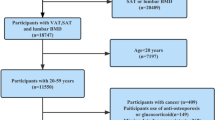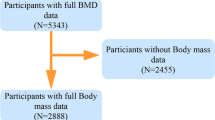Abstract
Summary
We examined ethnic difference in the association of body fat and trunk fat with bone mineral density (BMD) among Chinese, white, and black subjects. We found that, with greater body and trunk fat, both white and black subjects were more likely to have a low BMD than Chinese subjects.
Introduction
Ethnic differences in body fat, abdominal fat distribution, and BMD have been found in previous studies between Chinese and white subjects. However, the associations of body fat and abdominal fat distribution with BMD have not been studied, and whether the ethnic differences have an effect on these associations is unclear.
Methods
We evaluated 1,147 subjects aged ≥18 years (805 Chinese, 193 whites, and 149 blacks). Percent body fat (%BF), percent trunk fat (%TF), and total and regional BMD including that of head, arm, leg, trunk, rib, spine, and pelvis were measured by dual-energy X-ray absorptiometry. Linear regression models were developed to test the association of ethnicity, %BF, and interaction between ethnicity and %BF with BMD. The models were repeated again, replacing %BF with %TF.
Results
Chinese subjects showed lower BMD in total and most regions compared with black and white subjects; however, these differences were eliminated between Chinese and whites within both sexes and between Chinese and black men when age, weight, height, and %BF were added. %BF and %TF were negatively associated with most regional body BMD. The interactions between %BF, %TF, and ethnicity were found in most regional body BMD among Chinese, white, and black subjects for both men and women.
Conclusion
Both %BF and %TF have negative associations with BMD. With greater accumulation of %BF and %TF, both white and black subjects may experience a higher risk of low BMD than Chinese subjects.
Similar content being viewed by others
References
Wang Y, Tao Y, Hyman ME, Li J, Chen Y (2009) Osteoporosis in China. Osteoporos Int 20:1651–1662
US Dept. of Health and Human Services (2004) Bone health and osteoporosis: a report of the Surgeon General Public Health Service, Office of the Surgeon General, Washington, D.C. http://www.surgeongeneral.gov/libarary/bonehealth/content.html. Accessed 10 November 2009
Zhao LJ, Jiang H, Papasian CJ et al (2008) Correlation of obesity and osteoporosis: effect of fat mass on the determination of osteoporosis. J Bone Miner Res 23:17–29
Gnudi S, Sitta E, Fiumi N (2007) Relationship between body composition and bone mineral density in women with and without osteoporosis: relative contribution of lean and fat mass. J Bone Miner Metab 25:326–332
Reid IR (2008) Relationships between fat and bone. Osteoporos Int 19:595–606
Heiss CJ, Sanborn CF, Nichols DL, Bonnick SL, Alford BB (1995) Associations of body fat distribution, circulating sex hormones, and bone density in postmenopausal women. J Clin Endocrinol Metab 80:1591–1596
Stewart KJ, Deregis JR, Turner KL et al (2002) Fitness, fatness and activity as predictors of bone mineral density in older persons. J Intern Med 252:381–388
Zhao LJ, Liu YJ, Liu PY, Hamilton J, Recker RR, Deng HW (2007) Relationship of obesity with osteoporosis. J Clin Endocrinol Metab 92:1640–1646
Janicka A, Wren TA, Sanchez MM et al (2007) Fat mass is not beneficial to bone in adolescents and young adults. J Clin Endocrinol Metab 92:143–147
Hsu YH, Venners SA, Terwedow HA et al (2006) Relation of body composition, fat mass, and serum lipids to osteoporotic fractures and bone mineral density in Chinese men and women. Am J Clin Nutr 83:146–154
Fu X, Ma X, Lu H, He W, Wang Z, Zhu S (2010) Associations of fat mass and fat distribution with bone mineral density in pre- and postmenopausal Chinese women. Osteoporos Int 22:113–119
Afghani A, Goran MI (2006) Racial differences in the association of subcutaneous and visceral fat on bone mineral content in prepubertal children. Calcif Tissue Int 79:383–388
Kim CJ, Oh KW, Rhee EJ et al (2009) Relationship between body composition and bone mineral density (BMD) in perimenopausal Korean women. Clin Endocrinol Oxf 71:18–26
Gilsanz V, Chalfant J, Mo AO, Lee DC, Dorey FJ, Mittelman SD (2009) Reciprocal relations of subcutaneous and visceral fat to bone structure and strength. J Clin Endocrinol Metab 94:3387–3393
Wang J, Thornton JC, Russell M, Burastero S, Heymsfield SB, Pierson RN Jr (1994) Asians have lower BMI but higher percent body fat than do whites: comparisons of anthropometric measurements. Am J Clin Nutr 60:23–28
Gallagher D, Heymsfield SB, Heo M, Jebb SA, Murgatroyd PR, Sakamoto Y (2000) Healthy percentage body fat ranges: an approach for developing guidelines based on body mass index. Am J Clin Nutr 72:694–701
Lear SA, Humphries KH, Kohli S, Birmingham CL (2007) The use of BMI and waist circumference as surrogates of body fat differs by ethnicity. Obesity 15:2817–2824
Wang J, Thornton JC, Burastero S et al (1996) Comparison for BMI and body fat percent among Puerto Ricans, Blacks, Whites and Asians living in the New York City area. Obes Res 4:377–384
Deurenberg P, Deurenberg YM, Guricci S (2002) Asians are different from Caucasians and from each other in their body mass index/body fat per cent relationship. Obes Rev 3:141–146
Wang LD (2005) The status of nutrition and Health in China. People’s Medical Publishing House, Beijing, pp 13–27
Lear SA, Humphries KH, Kohli S, Chochalingam A, Frohlich JJ, Birmingham CL (2007) Visceral adipose tissue accumulation differs according to ethnic background: results of Multicultural Community Health Assessment Trial (M-CHAT). Am J Clin Nutr 86:353–359
Park YW, Allison DB, Heymsfield SB, Gallagher D (2001) Larger amounts of visceral adipose tissue in Asian Americans. Obes Res 9:381–387
Ross PD, He Y, Yates AJ et al (1996) Body size accounts for most differences in bone density between Asian and Caucasian women. The EPIC (Early Postmenopausal Interventional Cohort) study group. Calcif Tissue Int 59:339–343
Russell-Aulet M, Wang J, Thornton JC, Colt EW, Pierson RN (1993) Bone mineral density and mass in a cross-sectional study of white and Asian women. J Bone Miner Res 8:575–582
Wu XP, Liao EY, Huang G, Dai RC, Zhang H (2003) A comparison study of the reference curves of bone mineral density at different skeletal sites in native Chinese, Japanese, and American Caucasian women. Calcif Tissue Int 73:122–132
Xu L, Lu A, Zhao X, Chen X, Cummings SR (1996) Very low rates of hip fracture in Beijing, People’s Republic of China, the Beijing osteoporosis project. Am J Epidemiol 144:901–907
Jason CH (1996) Multiple comparisons: theory and methods. Chapman & Hall, London
Kontogianni MD, Dafni UG, Routsias JG, Skopouli FN (2004) Blood leptin and adiponectin as possible mediators of the relation between fat mass and BMD in perimenopausal women. J Bone Miner Res 19:546–551
Larsson B, Svärdsudd K, Welin L, Wilhelmsen L, Björntorp P, Tibblin G (1984) Abdominal adipose tissue distribution, obesity, and risk of cardiovascular disease and death: 13 year follow up of participants in the study of men born in 1913. Br Med J Clin Res Ed 288:1401–1404
Rexrode KM, Carey VJ, Hennekens CH et al (1998) Abdominal adiposity and coronary heart disease in women. JAMA 280:1843–1848
Wei M, Gaskill SP, Haffner SM, Stern MP (1997) Waist circumference as the best predictor of noninsulin dependent diabetes mellitus (NIDDM) compared to body mass index, waist/hip ratio and other anthropometric measurements in Mexican Americans—a 7-year prospective study. Obes Res 5:16–23
Kinjo M, Setoguchi S, Solomon DH (2007) Bone mineral density in adults with the metabolic syndrome: analysis in a population-based U.S. sample. J Clin Endocrinol Metab 92:4161–4164
Gordeladze JO, Drevon CA, Syversen U, Reseland JE (2002) Leptin stimulates human osteoblastic cell proliferation, de novo collagen synthesis, and mineralization: impact on differentiation markers, apoptosis, and osteoclastic signaling. J Cell Biochem 85:825–836
Klein KO, Larmore KA, de Lancey E, Brown JM, Considine RV, Hassink SG (1998) Effect of obesity on estradiol level, and its relationship to leptin, bone maturation, and bone mineral density in children. J Clin Endocrinol Metab 83:3469–3475
Krakauer JC, McKenna MJ, Buderer NF, Rao DS, Whitehouse FW, Parfitt AM (1995) Bone loss and bone turnover in diabetes. Diabetes 44:775–782
Genaro PS, Pereira GA, Pinheiro MM, Szejnfeld VL, Martini LA (2010) Influence of body composition on bone mass in postmenopausal osteoporotic women. Arch Gerontol Geriatr 51:295–298
Shen W, Chen J, Punyanitya M, Shapses S, Heshka S, Heymsfield SB (2007) MRI-measured bone marrow adipose tissue is inversely related to DXA-measured bone mineral in Caucasian women. Osteoporos Int 18:641–647
Conflicts of interest
None.
Author information
Authors and Affiliations
Corresponding author
Additional information
H. Lu and X. Fu contributed equally to this study.
Rights and permissions
About this article
Cite this article
Lu, H., Fu, X., Ma, X. et al. Relationships of percent body fat and percent trunk fat with bone mineral density among Chinese, black, and white subjects. Osteoporos Int 22, 3029–3035 (2011). https://doi.org/10.1007/s00198-010-1522-9
Received:
Accepted:
Published:
Issue Date:
DOI: https://doi.org/10.1007/s00198-010-1522-9




